





Over 85% of ecommerce businesses report that excellent customer support is critical for driving sales, retention, and brand loyalty. If you’re running an online store, you’ve probably experienced the challenge of managing customer inquiries across multiple channels—from email and live chat to social media and marketplaces.
Customer support tools like Zendesk, Freshdesk, Gorgias, and Intercom help ecommerce teams streamline support processes, automate repetitive tasks, and deliver seamless experiences that keep customers satisfied.
Whether you manage a small D2C store or a growing online retail business, choosing the right platform can save your team time, reduce response times, and provide actionable insights for improving customer service. In this guide, we’ll walk you through the top 11 customer support tools to help your ecommerce business provide a seamless, professional experience for every shopper.
Not all customer support tools are created equal. While most can handle basic ticketing and chat, the best ones go further—they centralize customer interactions, automate repetitive tasks, and provide actionable insights for improving service. Here are the key features to prioritize when choosing the right platform for your ecommerce business:
To identify the top customer support tools for ecommerce businesses, we analyzed several key factors to ensure these platforms streamline support workflows, improve team efficiency, and deliver a seamless experience for customers. Each tool was evaluated based on the following criteria:
We prioritized platforms that can manage email, live chat, social media, phone, and marketplace inquiries from a single dashboard, helping teams handle all customer interactions efficiently.
Tools that offer automated ticket routing, AI-powered responses, macros, and workflow rules were given higher consideration, as these features reduce response times and repetitive tasks.
We looked for tools with shared inboxes, internal notes, ticket assignment, and approval workflows, enabling support teams to collaborate effectively without losing context.
The depth of reporting was critical. We evaluated platforms based on their ability to track response times, resolution rates, customer satisfaction (CSAT), and agent performance, providing actionable insights to optimize support operations.
Seamless integration with Shopify, WooCommerce, BigCommerce, CRM systems, and marketing tools was essential to provide context-rich support and centralized customer data.
We assessed whether each platform allows custom workflows, ticket forms, user roles, and SLA rules, ensuring the tool can scale with business growth.
Finally, we considered the user interface and onboarding process, giving preference to platforms that balance powerful features with intuitive, easy-to-learn design.
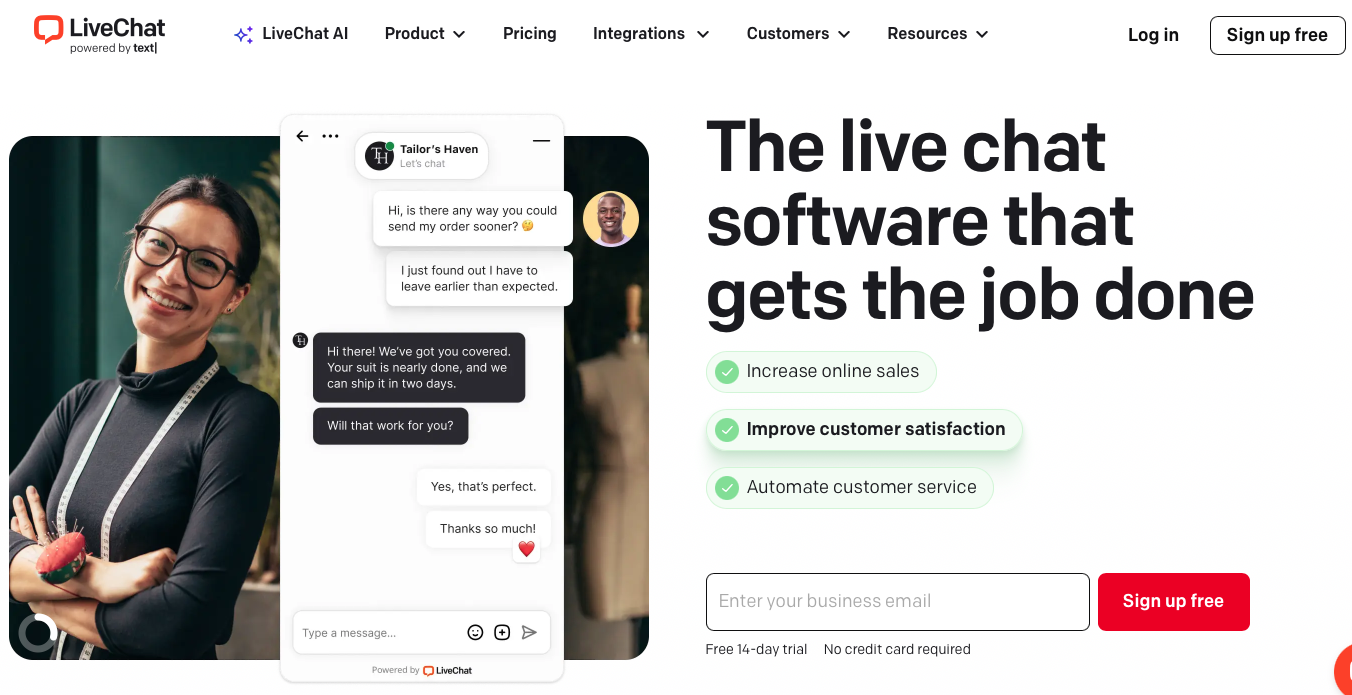
Customer support teams have a huge influence on how we perceive the online shopping experience, and whether our cart value grows. That’s why our top choice is LiveChat by Text. Shopify merchants using LiveChat generate an average of $11,000 in additional revenue per month, with an average order value of $430 from chat‑assisted sales.
It’s ideal for ecommerce businesses of all sizes that want more than just real-time support - it combines automation, advanced reporting, and AI-powered assistance with tools designed to actively drive sales.
Platform Coverage:
Web & Desktop: Browser access, macOS, and Windows desktop apps
Mobile: iOS and Android
Channels: Live Chat, Slack, Facebook Messenger, Instagram for Business, WhatsApp, Email, and Apple Messages (available on higher tiers)
Ecommerce Integrations: 200+ integrations, including Shopify, Magento, BigCommerce, WooCommerce, and the broader Zapier ecosystem
Pricing: A free, 14-day trial is available with full support from the LiveChat team.
Paid plans come in four tiers:
Reviews: 4.8 / 5.0 (Shopify App Store)
Ease of Use (UX/UI): Users consistently praise LiveChat for its clean, intuitive interface that agents can learn quickly, fast setup and onboarding, and helpful AI‑powered features such as message sneak‑peek and canned responses.
Customer Support: LiveChat is, unsurprisingly, heavily focused on live chat. The company provides 24/7/365 support, including email and a robust knowledge base. Phone support is available on higher tiers.
LiveChat by Text is one of the strongest real‑time support solutions for ecommerce brands. Its combination of fast chat performance, AI‑assisted workflows, and deep ecommerce integrations makes it ideal for businesses focused on increasing sales and customer satisfaction.
Its pricing is transparent and competitive, especially compared to enterprise‑heavy platforms. The ChatBot add‑on delivers powerful automation, though it does increase the overall cost.
For ecommerce teams that rely heavily on live chat for both sales and support, LiveChat stands out as a high‑value, scalable solution.
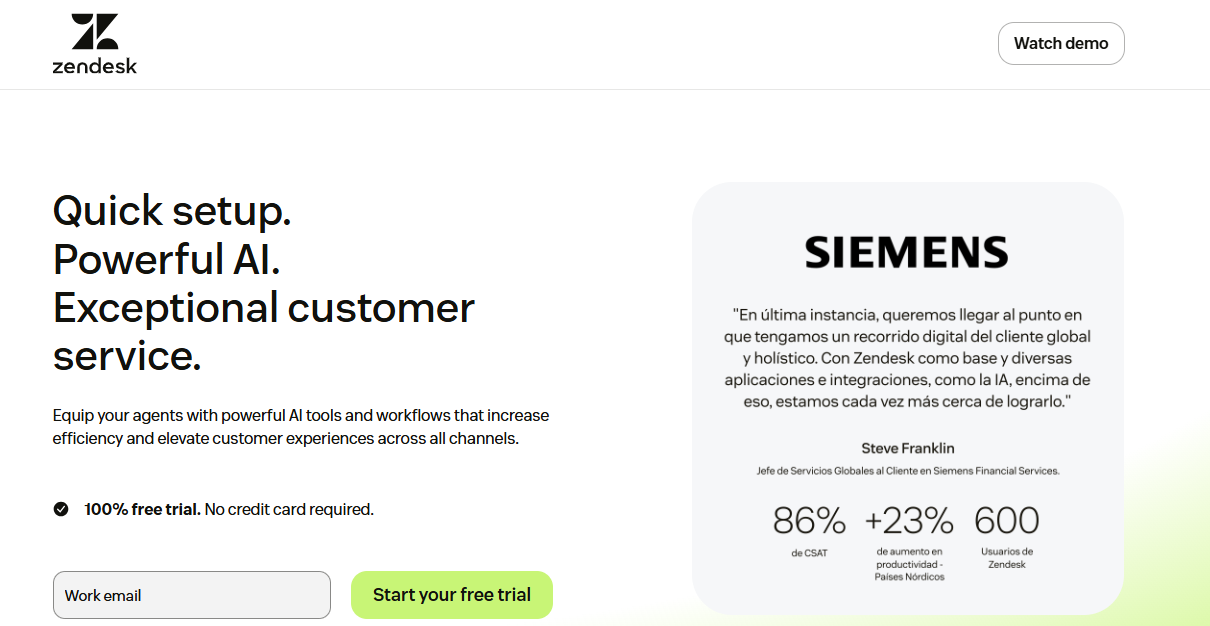
Best For: Ecommerce businesses of all sizes that need omnichannel customer support with automation and advanced reporting.
Platform Coverage:
Pricing: Based on our research, Zendesk offers a free trial to discover how it works. Price is not publicly disclosed.
Reviews: 4.3 / 5.0 (G2)
Ease of Use (UX/UI): Users note Zendesk’s modern interface and ability to manage conversations across multiple channels from one dashboard, though some report a learning curve with advanced features.
Customer Support: Zendesk provides 24/7 support via email, live chat, and phone for higher tiers, plus a robust knowledge base and community forum.
Zendesk is a market leader for a reason—it offers a robust, scalable solution for ecommerce brands looking to manage customer interactions at scale. Its AI-driven automation, omnichannel capabilities, and advanced reporting make it an excellent choice for mid-sized to enterprise ecommerce teams. However, smaller businesses with tighter budgets may find it costly compared to simpler solutions.
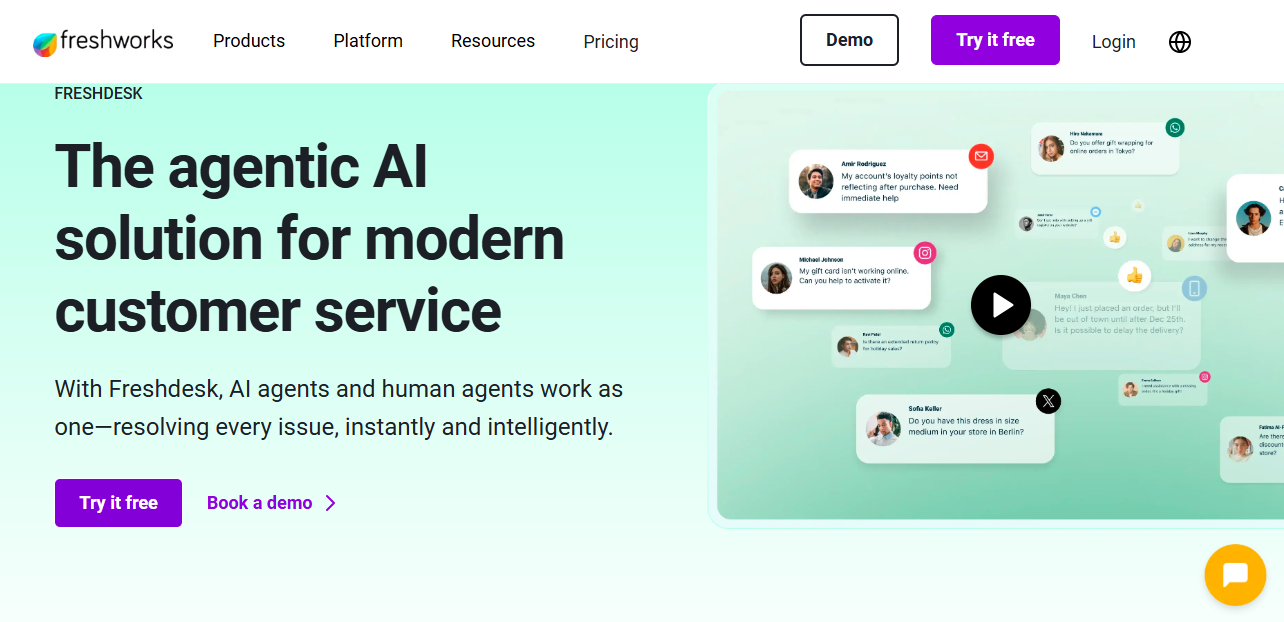
Best For: Small to medium-sized ecommerce businesses seeking a scalable and easy-to-use helpdesk with automation and omnichannel support.
Platform Coverage:
Web & Desktop: Browser access, macOS, and Windows desktop apps
Mobile: iOS and Android apps
Channels: Email, Live Chat, Social Media (Facebook, X, Instagram), WhatsApp, and Phone
Ecommerce Integrations: Shopify, Magento, WooCommerce, BigCommerce
Pricing: Based on our research, Freshdesk offers a free plan for up to 10 agents. Paid plans start at $15/agent/month, with more advanced features available in higher tiers.
Reviews: 4.5 / 5.0 (G2)
Ease of Use (UX/UI): Users appreciate Freshdesk’s clean, intuitive interface that allows teams to manage multiple channels efficiently, though some advanced automation setups may require time to configure.
Customer Support: Freshdesk provides 24/7 support via email and chat for paid plans, a comprehensive knowledge base, and community forums.
Freshdesk is an excellent choice for small to medium ecommerce businesses seeking a simple yet powerful customer support platform. Its AI-driven automation, omnichannel capabilities, and intuitive interface help teams respond quickly and efficiently, while its pricing remains accessible. Larger enterprises may need to upgrade to higher plans for full analytics and advanced workflow customization.

Best For: Ecommerce businesses, especially Shopify, Magento, and BigCommerce stores, looking for an ecommerce-first helpdesk with deep platform integration.
Platform Coverage:
Pricing: Based on our research, Gorgias offers a free trial. Paid plans are:
Reviews: 4.7 / 5.0 (G2)
Ease of Use (UX/UI): Users praise Gorgias’ intuitive interface and the ability to access customer and order data directly within the helpdesk, which streamlines responses and reduces navigation between platforms.
Customer Support: Gorgias offers email and chat support, a robust help center, and community forums for onboarding and troubleshooting.
Gorgias is tailored for ecommerce brands that need a helpdesk integrated tightly with their online store. Its automation, multi-channel inbox, and access to order details make it highly efficient for teams that manage high volumes of customer interactions. Smaller businesses outside ecommerce may find other solutions more flexible, but for retail stores, Gorgias is a top choice.
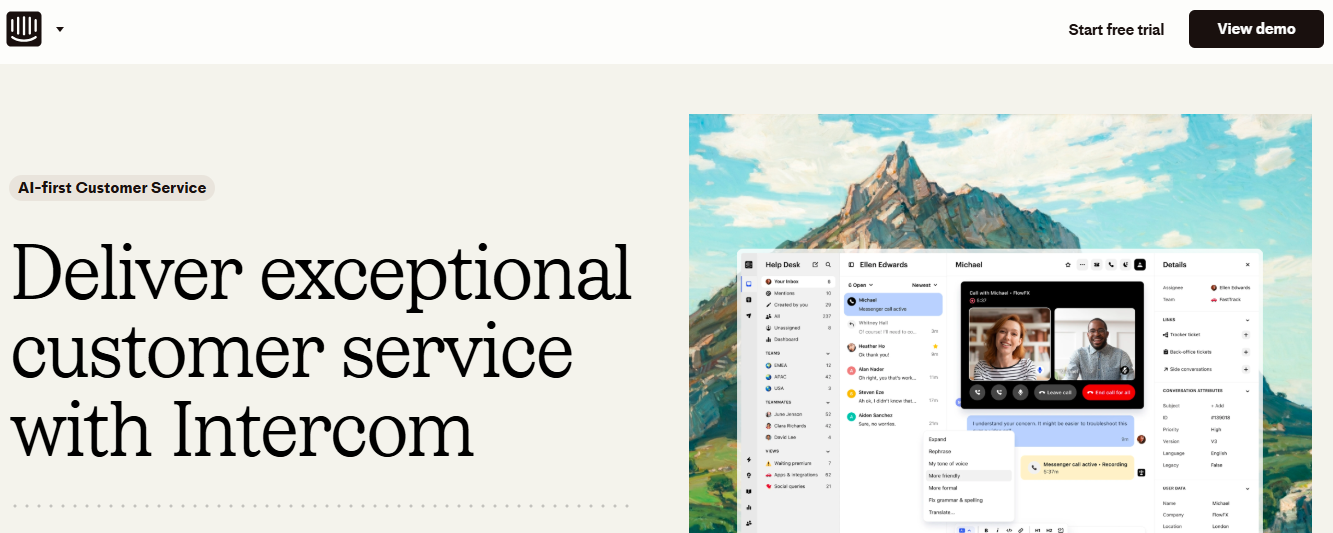
Best For: Ecommerce and SaaS businesses that want conversational support, in-app messaging, and AI-driven automation for both customer support and engagement.
Platform Coverage
Pricing: Based on our research, Intercom offers a free trial. There’s no pricing information on their website.
Reviews: 4.5 / 5.0 (G2)
Ease of Use (UX/UI): Users enjoy Intercom’s modern, intuitive interface and seamless chat experience. Some report that configuring advanced automation workflows requires time and planning.
Customer Support: Intercom provides email, live chat, and robust knowledge base support. Dedicated account managers are available for higher-tier plans.
Intercom excels for businesses that want a conversational approach to support and engagement. Its combination of live chat, AI automation, and customer data management allows teams to respond quickly while personalizing interactions. High costs and complexity may be a consideration for smaller businesses, but for ecommerce and SaaS companies seeking modern support workflows, Intercom is a strong contender.
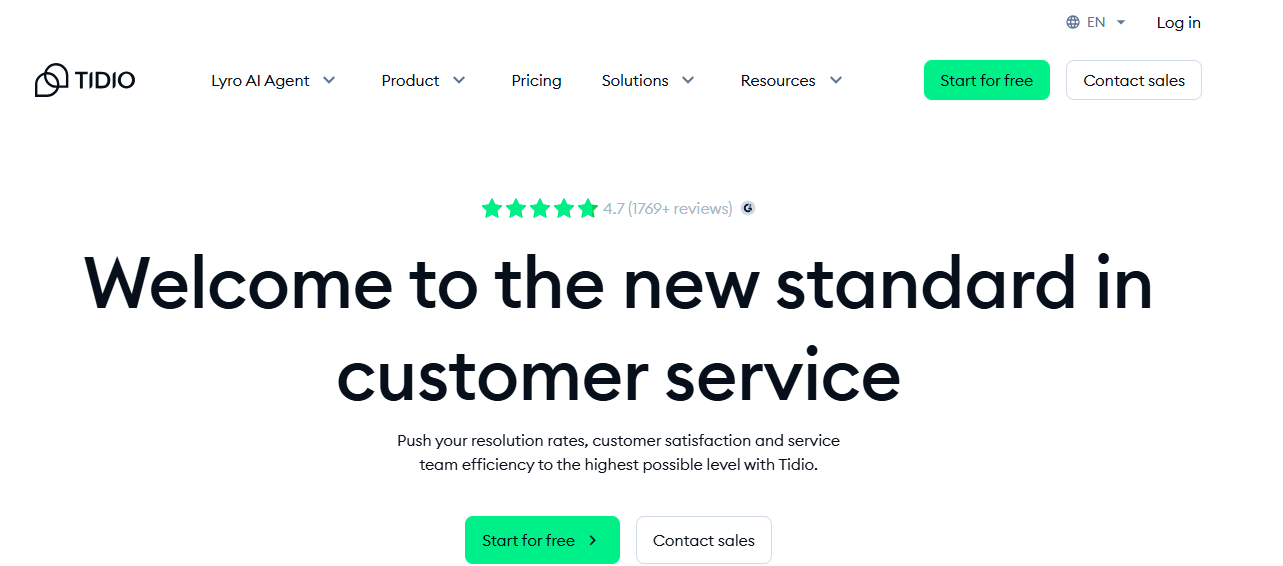
Best For: Small to medium ecommerce businesses looking for an easy-to-use live chat, chatbot, and email automation solution with affordable pricing.
Platform Coverage:
Pricing: Based on our research, Tidio offers a free plan with basic features for solo entrepreneurs.
Reviews: 4.6 / 5.0 (G2)
Ease of Use (UX/UI): Users praise Tidio’s simple, intuitive interface for quick setup and efficient conversation management. Chatbots and automation are easy to configure, even for non-technical users.
Customer Support: Tidio offers email and live chat support, a knowledge base, and tutorials for self-service guidance.
Tidio is an excellent choice for small to medium ecommerce businesses seeking a simple, affordable solution for live chat, chatbots, and multichannel messaging. Its automation and visitor tracking help reduce manual work and increase engagement. For larger teams or enterprises, more robust platforms like Zendesk or Gorgias may be a better fit.
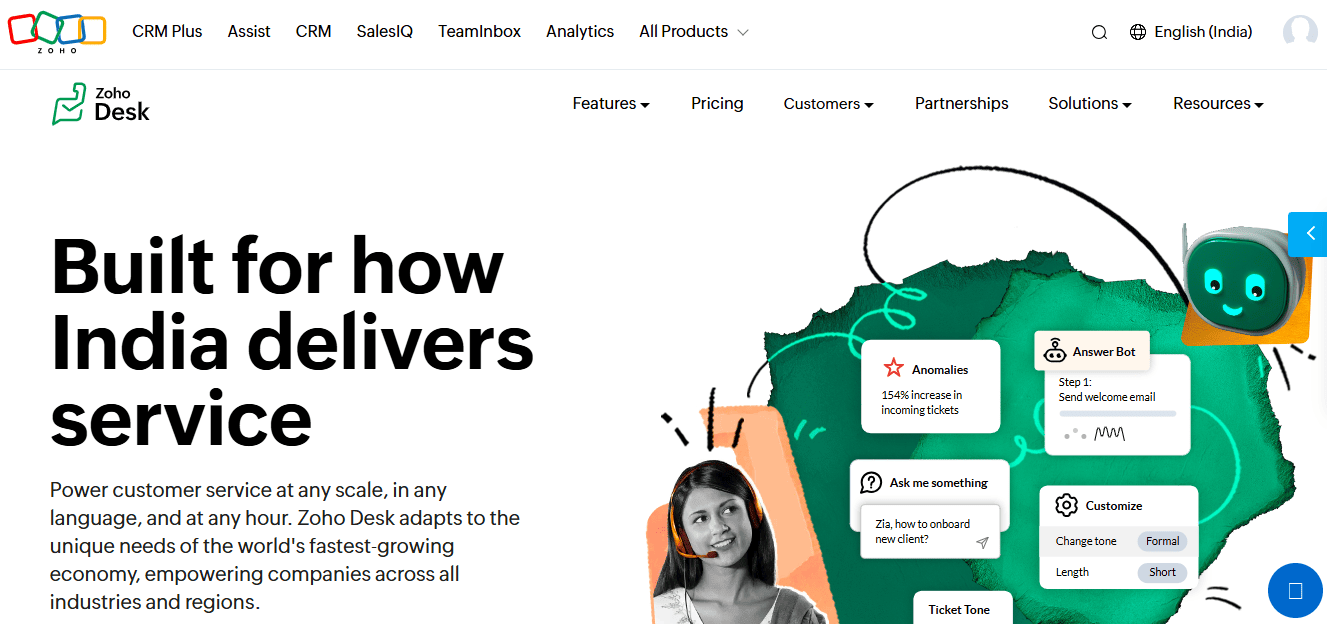
Best For: Ecommerce businesses and small-to-medium enterprises seeking customizable customer support with multichannel capabilities and AI-powered automation.
Platform Coverage:
Pricing: Based on our research, Zoho Desk offers a free plan for up to 3 agents.
Reviews: 4.4 / 5.0 (G2)
Ease of Use (UX/UI): Users appreciate Zoho Desk’s clean interface, customizable dashboards, and flexible ticket management, though advanced features may require initial setup.
Customer Support: Zoho Desk offers email, live chat, and phone support, along with an extensive knowledge base, tutorials, and community forums.
Zoho Desk is a versatile and scalable customer support tool ideal for ecommerce businesses that need automation, multichannel support, and robust analytics. Its AI assistant and workflow customization save time and improve customer satisfaction. While smaller businesses may need some onboarding for advanced features, Zoho Desk offers a strong balance between functionality and cost.
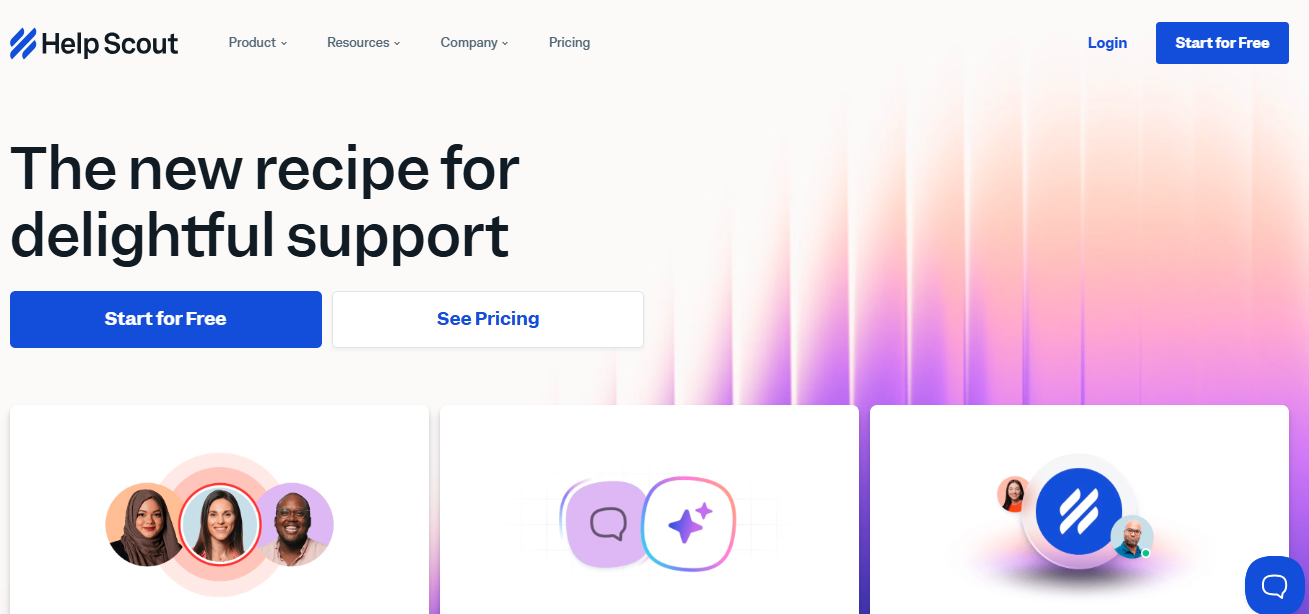
Best For: Small to medium ecommerce businesses looking for simple, email-focused customer support with collaborative team features.
Platform Coverage:
Pricing: Based on our research, HelpScout offers a free trial. Prices vary depending on the number of contacts per month. There are 3 main plans, typically starting at:
Reviews: 4.6 / 5.0 (G2)
Ease of Use (UX/UI): Users value HelpScout’s clean, intuitive interface and shared inboxes, making collaboration easy for small teams.
Customer Support: HelpScout provides email and live chat support, a knowledge base, and onboarding guides to help teams get started.
HelpScout is perfect for small to medium ecommerce businesses that primarily rely on email support but want team collaboration and self-service capabilities. Its simplicity, shared inbox, and knowledge base features allow teams to respond efficiently, though businesses needing multichannel support or AI automation may need to explore other platforms.

Best For: Ecommerce brands seeking a customer support tool tightly integrated with order management, shipping updates, and post-purchase communication.
Platform Coverage:
Pricing: Based on our research, Outvio Desk offers a free trial. Paid plans are not publicly disclosed on their website as pricing is upon quote/custom made.
Reviews: 4.5 / 5.0 (Capterra)
Ease of Use (UX/UI): Users highlight Outvio Desk’s clean interface and seamless integration with ecommerce operations, allowing teams to manage support and shipping communications efficiently.
Customer Support: Email and live chat support are available, plus a knowledge base and setup guides for onboarding.
Outvio Desk is ideal for ecommerce brands that want support tools connected to order management and shipping updates. Its automation and multichannel capabilities help teams reduce workload while keeping customers informed. For businesses needing broader integrations or enterprise-level features, larger platforms like Zendesk or Gorgias may be more suitable.
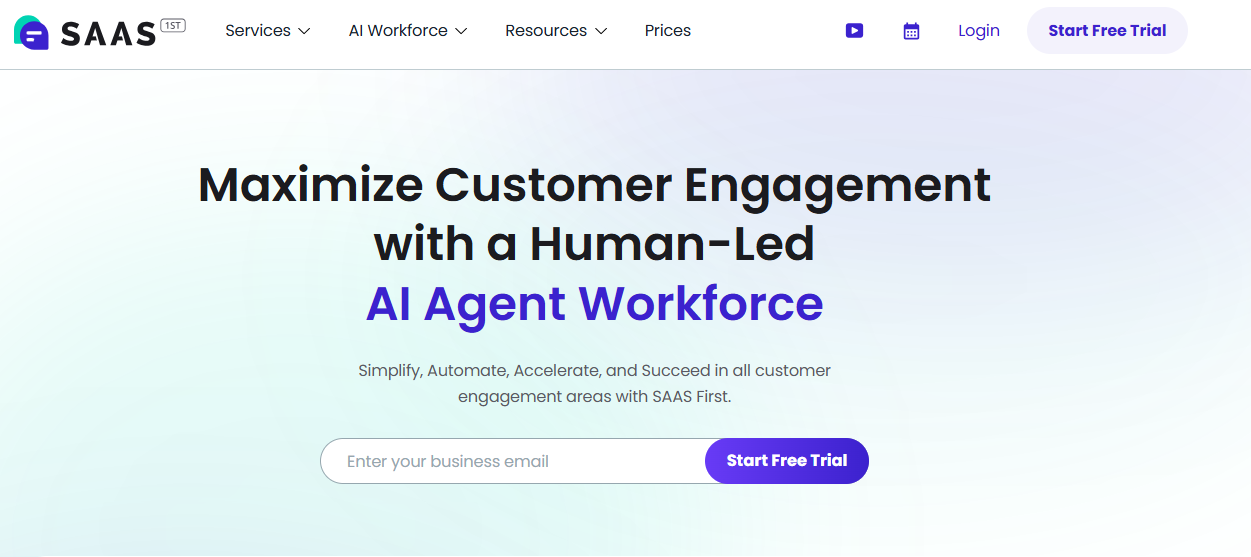
Best For: Ecommerce businesses and small-to-medium enterprises seeking cloud-based, scalable customer support with AI and automation features.
Platform Coverage:
Pricing: Based on our research, SAAS First offers a free trial. Paid plans start at $29/user/month for basic support, with advanced plans unlocking AI-powered automation, reporting, and multichannel messaging.
Reviews: 4.4 / 5.0 (G2)
Ease of Use (UX/UI): Users praise the modern interface, intuitive navigation, and ability to manage customer queries across multiple channels efficiently.
Customer Support: Email, live chat, and phone support are available, along with a comprehensive knowledge base and community forums.
SAAS First is a strong choice for ecommerce businesses that want AI-driven support and multichannel ticket management. Its automation, workflow flexibility, and reporting tools help teams respond faster and track performance efficiently. Small teams may need some training, but its scalability makes it suitable for growing businesses.
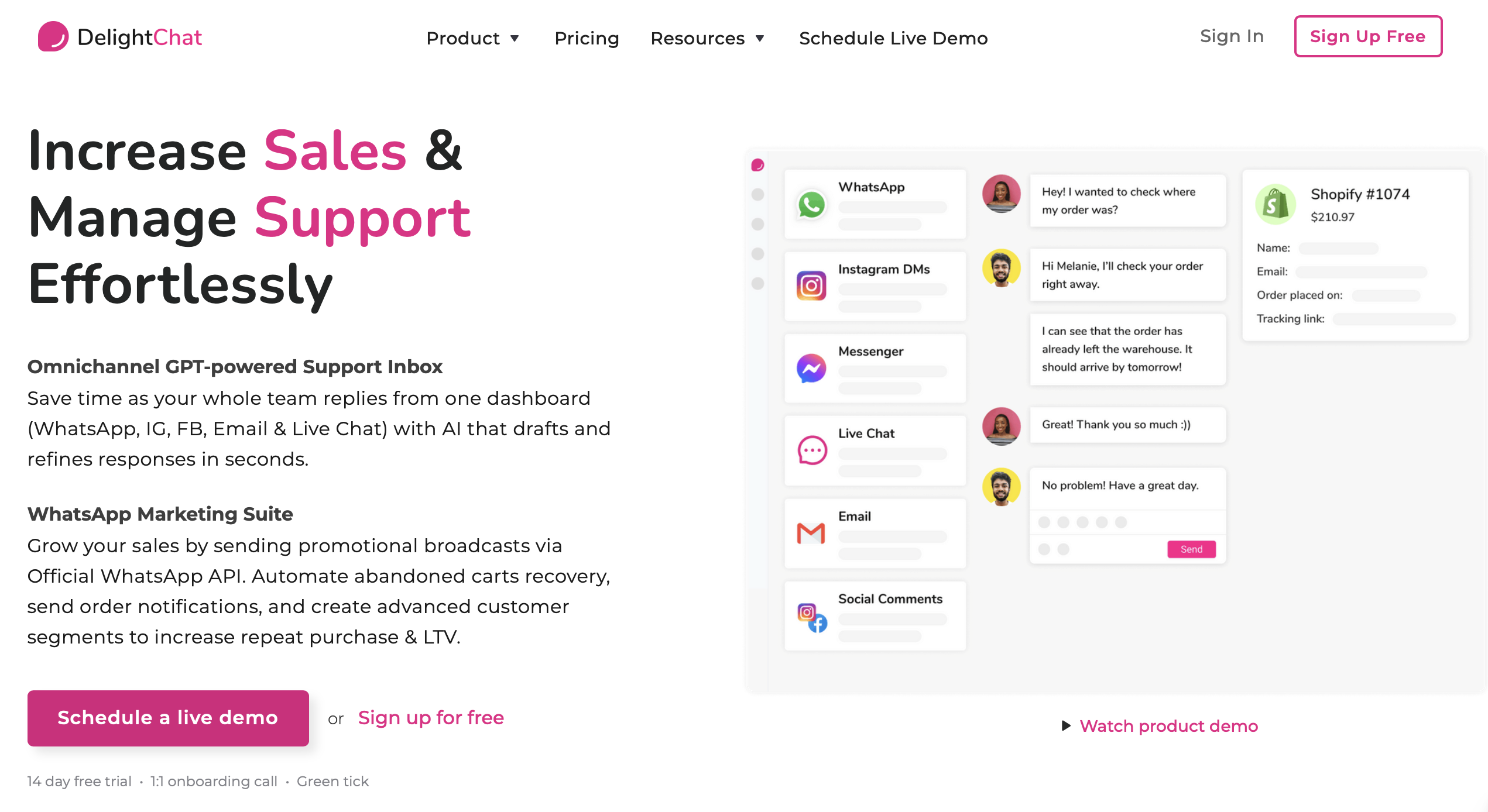
Best For: Ecommerce and D2C brands of all sizes that want to manage customer support across WhatsApp, Instagram, Facebook, Email, and Live Chat while also running WhatsApp marketing campaigns from a single platform.
Platform Coverage:
Pricing: Starts at $49/month (includes 1,000 tickets & 5,000 marketing contacts). Additional tickets & contacts available with add-ons. 14-day free trial and annual discounts available.
Reviews: 4.9 / 5 (Shopify App Store, based on 170+ reviews). Customers consistently praise its ease of use, fast onboarding, and excellent support. Many call it a “game-changer” compared to competitors like Zendesk and Interakt.
Ease of Use: Ridiculously simple to use with a clean interface. Setup takes less than 15 minutes. Some advanced WhatsApp API setups may require onboarding assistance (provided free).
Customer Support: Available during IST weekday business hours via live chat and email. Provides onboarding calls, a detailed help center, and is known for actively implementing customer feedback.
DelightChat is a great fit for ecommerce brands that want to manage support and WhatsApp marketing in one place. Its ease of use, Shopify integration, and strong reviews make it a smarter, more revenue-focused alternative to tools like Zendesk.
Providing seamless customer support is essential for ecommerce businesses looking to build loyalty, reduce churn, and improve overall customer experience. Whether you’re managing email inquiries, live chat, or social media messages, having the right support tool can make a significant difference in efficiency, response times, and customer satisfaction.
For ecommerce brands looking to streamline post-purchase communication and optimize team workflows, platforms like Zendesk, Gorgias, and Freshdesk stand out. Their omnichannel capabilities, automation, and robust reporting allow teams to resolve issues faster while keeping customers informed and engaged.
By selecting a customer support tool that aligns with your brand’s size, budget, and operational needs, you can ensure your team delivers consistent, high-quality support. The right platform empowers your business to stay responsive, build stronger relationships, and drive growth through exceptional ecommerce experiences.

For small ecommerce businesses, tools like Tidio and Freshdesk are ideal. They offer easy setup, intuitive interfaces, and essential automation features without overwhelming small teams.
Yes, most leading customer support tools integrate seamlessly with platforms like Shopify, WooCommerce, Magento, and BigCommerce, allowing teams to manage orders, returns, and customer queries from a single dashboard.
Absolutely. AI-powered chatbots, offered by platforms like SAAS First and Zendesk, can handle routine queries, provide instant responses 24/7, and free up agents for more complex support tasks.
Consider your team size, budget, preferred communication channels, and the need for automation and reporting. Evaluate tools that scale with your business and integrate with your ecommerce and marketing stack.
Yes. By providing omnichannel support, fast response times, automation, and self-service options, these tools help create seamless customer experiences, reduce resolution times, and increase overall satisfaction and loyalty.



Schedule a Demo with one of our media experts below.